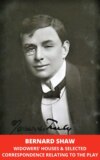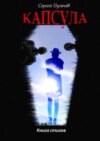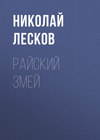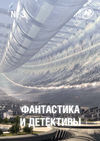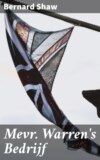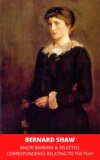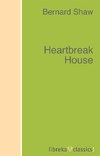Loe raamatut: «Widowers' Houses & Selected Correspondence Relating to the Play»
Bernard Shaw
Widowers’ Houses & Selected Correspondence Relating to the Play
Edited by Vitaly Baziyan
Copyright © 2021 Vitaly Baziyan
All rights reserved
An original didactic realistic play Widowers’ Houses was first called The Way to a Woman’s Heart, later the Rhinegold, and then German Rheingold, and at the end Widowers’ Houses. It was begun 1884 and finished 1892. The play was first published as no.1 in the Independent Theatre book series of plays by Henry and Co., London in May 1893.
This publication from a revised edition Plays: Pleasant and Unpleasant. The First Volume, Containing the Three Unpleasant Plays (Widowers’ Houses, The Philandered, & Mrs Warren’s Profession) published by Constable and Company Ltd, London 1919 is a handmade reproduction from the original edition, and remains as true to the original work as possible. The original edition was processed manually by means of a classic editing which ensures the quality of publications and the unrestricted enjoyment of reading.
The selected correspondence of Bernard Shaw relating to the play Widowers’ Houses contains 160 letters and entries written between 1885 and 1933. Sources of this collection are prior publications Collected Letters of Bernard Shaw published by Max Reinhardt; Bernard Shaw’s Letters to Siegfried Trebitsch published by Stanford University Press; Ellen Terry and Bernard Shaw: a correspondence and Our Theatres in the Nineties published by Constable and Company Ltd., London; Shaw on Theatre published by Hill and Wang, New York; Bernard Shaw’s Letters to Granville Barker published by Theatre Arts Books, New York; Shaw published by Oliver & Boyd, Edinburgh; Shaw’s Theatre published by University Press of Florida Book; Advice to a Young Critic published by Peter Owen Limited, London; The Diary of Beatrice Webb published by the Belknap Press of Harvard University Press; The Letters of Sidney and Beatrice Webb published by Cambridge University Press; edition of letters published by University of Toronto Press; Bernard Shaw: A Bibliography, in Two Volumes, Band 1 published by Oxford University Press; The Playwright & the Pirate. Bernard Shaw and Frank Harris: A Correspondence, Bernard Shaw: The Drama Observed and Bernard Shaw: The Diaries, 1885 – 1897 published by Pennsylvania State University Press.
The book represents a significant addition to modern-day understanding of Shaw’s play Widowers’ Houses ‘being a drama of the cash nexus in plot’, and reveals his thoughts on a wide variety of issues as well as his relationships with contemporaries.
George Bernard Shaw won The Nobel Prize in Literature for 1925 “for his work which is marked by both idealism and humanity, its stimulating satire often being infused with a singular poetic beauty.”
George Bernard Shaw won the Oscar in 1939 for Best Screenplay and Dialogue for his role in adapting his play Pygmalion for the screen.
Bernard Shaw’s punctuation and spelling were mostly kept by the editor. Italics were used for plays titles, books, newspapers and unfamiliar foreign words or phrases. Christian names, surnames, positions and ranks were added in square brackets when they were omitted but are necessary for a better understanding. Cuts of a few words are indicated by three dots and longer omissions by four dots.
The ebook cover was created by the editor using the photograph of a British actor James Welch who successfully played Lickcheese in the play Widowers’ Houses.
The play Widowers’ Houses was given a copyright performance by the Independent Theatre Society at the Royalty Theatre in London on the 9th December 1892. The copyright performance was staged in the United Kingdom for the purpose of securing the author’s copyright over the text. There was a fear that according to the Dramatic Literary Property Act 1833, if a play’s text was published, or a rival production staged, before its official premiere, then the author’s rights would be lost.
Characters in order of appearance:
Harry Trench – W. J. Robertson
William de Burgh Cokane – Arthur Whittaker
Mr Sartorius – T. W. Percival
Lickcheese – James Welch
Waiter – E. P. Donne
Porter – W. Alison
Blanche – Florence Farr
The Parlourmaid – N. de Silva
Producer – Herman de Lange
Widowers’ Houses was next time presented in public by Miss Annie Horniman’s Company at the Midland Theatre in Manchester on 7th October 1907.
Characters in order of appearance:
Harry Trench – A. G. Somers
William de Burgh Cokane – Charles Bibby
Mr Sartorius – Chas. Charrington
Lickcheese – B. Iden Payne
Waiter – Stanley Roberts
Porter – Rathmell Wilson
Blanche – Mona Limerick
The Parlourmaid – Clare Greet
Producer – B. Iden Payne
Selected Correspondence Relating to the Play Widowers’ Houses
1/ Bernard Shaw’s diary
Preliminary Notes 1885
RESIDENCE: 36 Osnaburgh St. London, N.W. all the year round. Name of Landlord: Johns. We had the second floor, and a room on the third in which I slept.
HABITS: Work every day in the reading room at the British Museum. Dined every day at the Wheatsheaf Vegetarian Restaurant, Rathbone Place. When I lay too late in the mornings (which was most often the case) I did not go to the Museum until after dinner, which I took at 14 or 15 o’clock. My habit of spending every Saturday evening with J. K. [James Kingston] Barton at his house, 2 Courtfield Road, Gloucester Road, S. W. was kept up but with many interruptions owing to the frequency of both his engagements and mine. The Sunday evenings with Pakenham Beatty at 62 Sinclair Road, West Kensington were much interrupted by lectures etc., and finally ended on his removal to Mill Hill Park.
OBITUARY: 19th April. My father at 21 Leeson Park Avenue, Dublin. [19th] December. My maternal grandfather, Walter Bagnall Gurly.
OCCUPATION: Journalism. William Archer procured me an appointment as musical critic to The Dramatic Review, a journal started in February by an Irishman named Edwin P. Palmer. My first article appeared in the second number (8/2/—). At first I contributed only signed articles, but later in the year I wrote a set of paragraphs every week for the musical column. The paper ceased to pay in the autumn, and I am now keeping up the paragraphs without any hope of getting paid for them. Archer also procured me a place on the reviewing staff of The Pall Mall Gazette, in which my first article appeared on the 16th May. The Magazine of Music applied to me for articles pretty regularly during the later months of the year. One of these contributions was a scrap of fiction, written in 1881, entitled “The serenade.” Contributed art notes to Mrs [Annie] Besant’s magazine Our Corner under the heading “Art Corner” every month from June onward. Early in the year, I edited [Laurence] Gronlund’s Co-operative Commonwealth for The Modern Press. I gave up the idea of completing the Lodge Index on my father’s death, and handed it over to Thomas Tyler.
NOVELS: In April Cashel Byron’s Profession began its course through To-Day and The Irrational Knot through Our Corner. The latter was paid for at the rate of 5/— a page. The work of revising and correcting them, and the journalism, left me no time to do any original work.
LECTURES, ETC.: Took an active part in the Fabian Society. Wrote two pamphlets for it, and worked on the executive. For lectures and debates see Engagements. Gave my first provincial lecture at Leicester on 22nd November. Continued a member of the Bedford, Browning, and Dialectical Societies and attended the meetings of the New Shakspere Society pretty regularly.
FADS, ETC.: Continued vegetarianism. Took to the woollen clothing system, and gave up using sheets in bed. Acting: Made an attempt to act in a third rate comedy at Notting Hill with the Avelings [Edward Aveling and Eleanor Marx], on the 30th January.
FAMILY CIRCUMSTANCES: My father’s death in April put a stop to the 30/— a week he had been sending us, but we got nearly £100 by a policy of insurance on his life. With this we could do little more than pay off our debts and replace our worn-out clothes. [My sister] Lucy was at work on the stage in the provinces all the year. My mother suddenly struck a new vein of work as the teacher of singing in the High Schools towards the end of the year. I also slipped into paid journalism; but this put a stop to my life’s work.
STUDIES: Almost nil. Towards the end of the year I began to read German with Sidney Webb once a week, but I pursued it in a very desultory manner. I lost much time by my laziness in the matter of getting up in the morning. I had no time to read much in economics, but I attended a circle at Hampsteed formed for the study of [Karl] Marx and [Pierre-Joseph] Proudhon; and in November I began to go to the house of [Henry R.] Beeton, a stockbroker in 42 Belsize Square where [Herbert Somerton] Foxwell, [Philip] Wicksteed, [Francis Y.] Edgeworth and others met fortnightly to discuss economic questions. My practical interest in music was revived by my duties as critic of The Dramatic Review.
[SEX LIFE:] On the 26th July, my 29th birthday, begins an intimacy with a lady [Mrs Jane “Jenny” Patterson] of our acquaintance. This was my first connection of the kind. I was an absolute novice. I did not take the initiative in the matter.
2/ Bernard Shaw’s diary entry for 25th August 1885
Princess’s Theatre. Hoodman Blind [by Wilson Barrett and Henry Arthur Jones].
Copy out some of the drama [later called the Rheingold or Widowers’ Houses] I began [with William Archer on the 18th August] last year. Saw Archer at Museum. On my return found JP [Jane Patterson] here very angry because [Risden H.] Home had written to her friend [Robert] Boyle about something that I told him. Took her off to Princess’s. May Morris there with the Walkers (Emery) and the Pennells [Joseph Pennell and the writer, not the actress Elizabeth Robins]. Went to restaurant to get JP a cup of coffee. Home with her.
Dinner 1/- PMG [Pall Mall Gazette] 1d Rec’d: Mrs Besant £3/8/9
3/ Bernard Shaw’s diary
Preliminary Notes 1886
This page I am writing up on the 26th December 1887, having in my inveterate laziness and procrastination put it off for a whole year.
RESIDENCE: Still 36 Osnaburgh St.
HABITS: The same as last year, except that I made a stand against late rising by using an alarum clock and actually succeeding in getting up regularly at 8 every morning until the end of the year when the clock broke and I began immediately to relapse. I got a new clock, but did not quite regain my punctuality, which by and by, made me so sleepy in the afternoon that I got into the habit of taking a nap in the Museum over my books.
OCCUPATION: Writing reviews for the Pall Mall Gazette and notices of picture exhibitions for The World (Archer procured for me the post of art critic on that paper on resigning it himself in February) for my living, and lecturing etc. on Socialism.
NOVELS: Wrote no new fiction. Cashel Byron I published in a shilling edition by Champion in February, and in New York by Harper’s in December.
LECTURES, SOCIETIES, ETC.: Same as last year. The Hampstead Marx Circle became the Hampstead Historic Club.
STUDIES: Made a desperate attempt to learn and work through [Heinrich Godefroy] Ollendorff from end to end, but did not find myself much the forwarder for it.
FAMILY CIRCUMSTANCES: Mother teaching at public schools—class singing. Lucy on the stage as comic opera prima donna. During this year my work at the Fabian brought me much into contact with Mrs [Annie] Besant, and towards the end of the year this intimacy became of a very close and personal sort, without, however, going further than a friendship.
4/ Bernard Shaw’s diary
Preliminary Notes 1887
RESIDENCE: 36 Osnaburgh St. until the 4th of March, when we moved to 29 Fitzroy Sq., of which we took the 3rd and 4th floors. But as the new rooms were then uninhabitable I stayed at Barton’s, 2 Courtfield Rd., until the 21st March, on which day I took up quarters at Fitzroy Sq. The move was forced upon us by the bankruptcy of the landlord at Osnaburgh St.
HABITS: I continued the old routine at the British Museum until the middle of September, when finding that it was impossible to work amid acquaintances who kept constantly coming to chat with me, I turned one of the rooms on the top floor here into a studio and gave up the Museum. I also drew up a timetable to which I stuck well at first, but rather lamely afterwards, especially as I relapsed more and more into my old bad habits as to late rising. But it enabled me to copy out the unfinished drama [later called Widowers’ Houses] I wrote in shorthand in 1884. When it was finished (that is, the transcript, not the drama) Archer ridiculed it. I then dropped it, and left it with him, subsequently suggesting that he should give it to H. A. [Henry Arthur] Jones, who might borrow a notion from it for a drama touching socialism. The timetable also made provisions for some work at algebra and German, at both of which I made very slow and precarious progress. A good deal of laziness, late rising, and remorse towards the end of the year.
OCCUPATION: Criticism for my living, and socialism for my unpaid work. Literary criticism in the Pall Mall Gazette, criticism of pictures in The World, and the payments from Our Corner for The Irrational Knot and Love Among the Artists providing me with money. My Mother of course helped by her teaching, chiefly of class singing at high schools. In June I succeeded [William] Archer as a correspondent of the New York Epoch, but after writing two letters to them I gave it up, as they asked for fashionable gossip.
FAMILY EVENTS: My sister Lucy was married to Charles Edward Butterfield, an actor aged 35 (her own age being 34) at St. John’s Church, Charlotte St., Fitzroy Sq., on the 17th December.
NOVELS: I began a new one on the 14th May and kept at it for a day or two, then continued at longer intervals until the 14th June, when I gave it up from want of time. An Unsocial Socialist was published in the spring in one volume at 6 shillings; but it did not sell at this price. In July I wrote a sketch entitled “Don Giovanni Explains” for Unwin’s Annual; but the Annual was not published in consequence of [Henry] Norman, the editor, going abroad for a trip, and the sketch was left on my hands.
STUDIES: None, except the work at algebra and German reading described above under “Habits,” and such studies as my reviewing needed.
SOCIETIES, LECTURES, ETC.: In July I joined the Parliamentary Debating Society called the Charing Cross Parliament, where a Socialist government was formed of which I was a member (President Local Government Board). As this met on Friday, it kept me away from the New Shakspere and Browning Societies during the latter half of the year. Otherwise I kept up last year’s habits as far as societies are concerned. Tuesday meetings at Beeton’s were discontinued during the early half of the year, but resumed in the winter for the discussion of [Philip Henry] Wicksteed’s MS. of a primer of economics. [Henry Ramié] Beeton had meanwhile moved to 9 Mansfield Gardens (see “Studies” 1885).
DOMESTIC CIRCUMSTANCES: Same as last year; but as our rent was reduced and our earnings rather enlarged, we got a new piano on the hire system and began to live a very little more freely.
[SEX LIFE:] The intimacy with Mrs [Annie] Besant alluded to last year reached in January a point at which it threatened to become a vulgar intrigue, chiefly through my fault. But I roused myself in time and avoided this. I however frequently went to her house on Monday evenings and played pianoforte duets (mostly Haydn symphonies arranged) with her. At Xmas, I returned her all her letters and she mine. Reading over my letters before destroying them rather disgusted me with the trifling of the last two years or so about women.
HEALTH: Bad feverish cold caught on the evening of the 13th January, bad on 15th, 16th, and 17th on the mend. Lost my voice completely from lecturing on the 16th—could hardly speak for 3 days and had to lecture very carefully on the 23rd. A slight but nasty little cold on the 26th-28th March. Got a slight cold which took the form of a touch of neuralgia on the night of the 25th April, but it passed off in a day or two. However, on the 2nd May, in the following week, I got a sore heel, as if the tendon of Achilles were strained. I first felt it at tea on the 2nd, and was very lame next day. Began to feel the rancour produced by the hot weather on the 2nd July.
Slight looseness of the bowels on August 16th and for a few days after, due perhaps to eating a melon at Mrs Besant’s on the evening of the 15th. Violent cold in the head developed itself during the afternoon of the 19th August. By the 20th still pretty bad, but beginning to mend on the 21st, but as I had to speak in the open air in the evening I lost my voice. Slept soundly. 22nd still on the mend. Voice began to come back on the 24th. Had a slight attack of giddiness and nausea, which rather alarmed me, as there was an epidemic of scarlet fever at the time. 20th September. Catarrh from the wretched cold and fog on the 17th November lasted until the weather got better.
5/ Bernard Shaw’s diary entry for 3rd September 1887
Barton. First night of Pleasure [by Paul Meritt and Augustus Harris] at [The Theatre Royal] Drury Lane. Tea with Archer.
Still at the Interest article. [Robert William] Lowe and his wife at Archer’s. Copy a little of the play [named the Rhinegold later Widowers’ Houses] I began in 1884 at Archer’s suggestion.
Dinner 1/2 PMG 1d Programme at Drury Lane 6d Lent [Henry Chance] Newton 1/-
6/ Bernard Shaw’s diary entry for 1st October 1887
Soirée of the Photographic Society. 5 Pall Mall East. (Old Water Colours [Society]). 20. Private View. 12 to 17. Mrs Besant’s in the forenoon. No. Put off.
Called at E.[mery] Walker’s at Clifford’s Inn. Arranged that he should come on to the Photographic Society. Dined at the Palgrave. Went to Photographic Society. Was introduced to [Henry Trueman] Wood of the Society of Artists by [Thomas] Bolas and we all went to the Camera Club and had coffee and conversation. Got my hair shampooed in Great Russell St. and went to Archer’s. Found he had gone to Liverpool, but had a talk with Mrs Archer [née Frances Elizabeth Trickett] about his trying his luck with the drama [named the Rhinegold later Widowers’ Houses] in collaboration with me. Came home and read during evening.
Dinner 1/—
7/ Bernard Shaw’s diary entry for 4th October 1887
Fitzgerald Molloy’s in the evening.
[James Leigh] Joynes, back from Durham, was at the Wheatsheaf. Continued review of musical books. Went to the Stores and left the French edition of [Karl] Marx’s Capital to be bound. Went on to the City to buy a diary for next year, but they were not published yet. Bought [Benjamin] Franklin’s biography in shorthand at Pitman’s. Met W. [Walter H.] Coffin at Holborn Viaduct. Finished copying the play [the Rheingold later Widowers’ Houses] and left the MS. at Archer’s on my way to [Joseph Fitzgerald] Molloy’s. Archer was not at home. Robbie Carl was here when I went out, also Dot Wilkinson. Phene Spiers, Oscar Wilde, Capt. Sargent and others at Molloy’s. Fotune telling etc. Spiers walked part of the way home with me. Not in until past 1. Mathers was the name of the man who read my character from my hand at Molloy’s in the evening.
Dinner 1/2 Bus Bedford St. to St. Paul’s 1d Franklin’s Autobiography in shorthand 1/6 Train Farringdon Rd. to Portland Rd. 2d
8/ To a Scottish writer, theatre critic, playwright, Henrik Ibsen’s translator and early friend William Archer
4th October 1887
I have left the first two acts of the Rheingold at John St, in longhand. They are not supposed to be complete; but they present a series of consecutive dialogues in which your idea is prepared and developed. The central notion is quite perfect; but the hallucinations with which you surrounded it are absent: you will have to put them in yourself. The bathing place is impossible; and I dont see how the long lost old woman is to be introduced without destroying the realism and freshness of the play: she would simply turn the thing into a plot, and ruin it. I think the story would bear four acts; but I have no idea of how it is to proceed. The peculiarity so far is that there is only one female character; and her social isolation is essential to the situation. Will you proceed either to chuck in the remaining acts, or provide me with a skeleton for them? You will perceive that my genius has brought the romantic notion, which possessed you, into vivid contact with real life.
I should prefer the St James’s Theatre, with Mrs Kendal [Madge Kendal née Margaret Shafto Robertson] as Blanche, [John Hare] as Sartorius, [William] Mackintosh as Lickcheese, Arthur Cecil as Cokane, and [William Hunter] Kendal as Trench. Or Ellen Terry as Blanche, Wilson Barrett as Sartorius, George Barrett as Lickcheese, [Henry] Irving as Cokane, and [Edward W.] Gardiner as Trench. Harry Nicholls or Edward [O’Connor] Terry might understudy Cokane; and Alma Murray might in extremity be allowed to play Blanche. What is your opinion? I think, by the bye, that the title Rheingold ought to be saved for a romantic play. This is realism.
GBS
PS Never mind clerical errors: I have not read it over. And the details as to the hotel garden, the time &c, are all at sixes and sevens.
9/ Bernard Shaw’s diary
Preliminary Notes 1888
HEALTH
Slight cold (catarrh only) during the first week in January caused by the break up of the frost and the return of damp, warm weather. Moderate cold caught on the break up of the cold weather on the 21st April, hanging about me during the following week. Got completely wet in the rain on the 17th and again on the 22nd July. After the 22nd I got slight cold in the head and bellyache—a new affliction, or at least one which I had not had since my childhood. On the 26th this suddenly developed into one of my regular bad colds, the first I have had this year. I had attributed my immunity for so long to my having taken early in the year to the habit of wearing gloves for the first time in my life. On the 28th it was mending so fast as to be bearable and on the 29th, although the rate of mending, as usual, slackened disappointingly, it was nothing to complain of. But I lost my voice by talking all that day and could not speak above a whisper next day. The remains of it wore out slowly during the following week. On the evening of the 20th October I went to the opening of the Shaftesbury Theatre after calling for a moment on Mrs Archer and rallying her about the sore throat which prevented her from going and which I pretended not to believe in. At the end of the second act of the play I found that my own throat was sore, and I passed an uneasy, half-delirious sort of night. Next day I was out of sorts, and the affliction hovering about me a little until the 23rd, when I was practically well. Found my throat ticklish on the 3rd December and almost lost my voice after my lecture on the 4th. Still very bad on the 5th when I spoke at the Dialectical Society. The cold which caused this did not come to anything; but it hung about me for some time. On the night of the 20th December I got a very slight attack in my left lower jaw, and the 21st I was exceedingly depressed and out of sorts. The attack persisted through the night, though it was not severe enough to keep me quite awake; but towards morning I got fast asleep and when I woke, the gum had swelled and the ache was quite gone—I had also quite recovered my spirits. However, except for a day or two after my walk with [Sydney] Olivier on Christmas Eve, I remained in low health and spirits almost until the return of the sunlight in the spring of 1889, q.v.
10/ To an English actress Alma Murray, the wife of the poet Alfred William Forman
24th February 1888
Dear Mrs Forman
I shall blight the Bedford as gently as possible. Somehow, competent people never will lecture. I delivered sixtysix lectures last year on subjects which I certainly do not know half as much about as you do about acting.
I really cannot refrain from saying a word about “Christina.” The authors [Percy Lynwood and Mark Ambient] are known to me as harmless and estimable men out of the theatre; but it infuriates me to see good gifts wasted on such stuff. At its production last year I raged over it for ten minutes to an acquaintance with whom I had once slept in a haunted house. He agreed with me, and then mentioned that he was the collaborator of [Mark] Ambient. However, it served him right. I wish I could write you a real play myself; but unfortunately I have not the faculty. I once wrote two acts of a splendid play [named the Rhinegold later Widowers’ Houses], and read them to an eminent dramatic critic [William Archer]. He laughed the first to scorn, and went asleep in the middle of the second; so I made him a present of the MS [manuscript] (to his intense indignation) and set to work to destroy the society that makes bad plays possible. What a career you will have when that work is completed! I look forward, breathless, to the Blot [A Blot on the ’Scutcheon by Robert Browning]. They did it once before, at St George’s Hall, with, oh! SUCH a Mildred! Good Heavens! In short, thank you for your kind reception of our proposal.
yrs very truly
G. Bernard Shaw
11/ Bernard Shaw’s diary
Preliminary Notes 1889
INTRODUCTIONS
Edvard Grieg, at the Philharmonic rehearsal, St Jas’s Hall, by H. L. [Hans Lien] Braekstad. 13th. Mar.
Johannes Wolff, at the Philharmonic rehearsal, St Jas’s Hall, by Mrs T. P. [Thomas Power] O’Connor. 13th. Mar.
Henry George, at the Philharmonic rehearsal, 31 Upper Bedford Place, by Stewart Headlam. 7th Ap.
Hedwig & Elsa Sonntag at Portsdown Road by the Oliviers—12th. June.
Janet Achurch, Charles Charrington, Fru Backer Grøndahl, D. Hagerup, Herr Barth, Frolien Reimers, and Fru Laura Gundersen, at the Novelty Theatre—“Doll’s House” dinner. 16th. June.
Mrs Mona Caird, at the Fine Art Society’s Gallery, by William Sharp. 28th. June.
Stanley Little, at Charing + railway station, by Edward Rose. 5th. July.
Miss [Annie Payson] Call, at 44 Devonshire St. Portland Place, by W. Archer. 15th. July.
[James R.] Osgood, at Natl. Lib. Club., by S.[idney] Webb. 12th. Sept.
Wm. C. Ward, at 4 Mount Ararat, Richmond, by H.[oward] Swan. 6th. Oct.
F. C. Barker, at 49 Gwendon Road, by A. B. [Arthur Bingham] Walkley. 5th. Oct.
Mrs [Louise] Jopling Rowe, at Arts & Crafts Exhibition Private View. ? 5th. Oct.
Karl Armbruster and wife, at 16 Queens Road, Bayswater, by himself. 11th. Oct.
Earl of Crawford, at 23 Brompton Square, by J. P. [Mrs Jane “Jenny” Patterson] 12th. Oct.
[F. G.] Prange, at 23 Brompton Square, by J. P. 27th. Oct.
Major Lett, at 4 Courtfield Road, by D. J. Slater. 2nd. Nov.
Edwin Human, at 38 Gloucester Road (Salt’s), by Grace Black. 9th. Nov.
Samuel Butler, at Cliffords Inn, by Emery Walker. 15th. Nov.
Miss [Annie] Oppenheim, at 23 Brompton Sq., by J. P. 16th. Nov.
Canon [Edward Deacon] Girdlestone, at 10 Delamere Terrace. Westbourne Sq., by R.[obert] E. Dell. 17th. [December].
MEMORANDA OF THINGS LENT
Date Article To Whom Lent Returned
Oct. 10 “Parsifal” vocal score Mrs [Catherine] Salt 29th Oct
Nov. 1 MS. “Love Among Artists” D. Gordon (Walter Scott [firm])
Nov. 25 “Parsifal” v.s. A. R. [Alfred Robert] Dryhurst
Dec. 6 MS. “Don Gio. Explains” H. W. [Henry William] Massingham 7 Dec.
HEALTH
During the early part of the year I was nervous, depressed, and in unsatisfactory health in general as far as my nerves were concerned. When the spring came and the sunlight returned I recovered. In April and most of May in particular, I was in capital working condition and in good spirits.
On the 15th May I had a terribly feverish night, with symptoms of a general inflammatory condition, especially in my teeth. This passed off next day; but on the night of the 19th I had the same experience in an aggravated degree, and next day I suffered so much from weakness, nausea, headache etc. that I concluded that I had caught a serious fever for the first time since my attack of smallpox in 1881. However, towards evening on the 20th I felt stronger, and went to the opera, although I earlier in the day had given up the idea of attempting such a thing. During the night of the 20th I slept with only a few breaks during which I found myself sweating profusely. Next day my throat was sore; but I could eat and my weakness was gone. My repeated public addresses in the following week knocked up my throat altogether; and I had to stop speaking for about three weeks, during the last of which I diligently practised scales and singing. This cured me completely.
On the 1st September, coming home from the second lecture that day, I was conscious of a certain sensation which I can only describe as a hollowness and vibratoriness about the heart which suggested to me, not for the first time, that I should be careful not to overexert it.
On the 25th October, in the evening, I began to shiver, and had a bad feverish night. This was another of my new sort of colds. The chill seems to have replaced the influenza with me. It left a cough hanging about me for some time; and on the 3rd November my throat got so ticklesome after a walk in the rain that I could hardly lecture in the evening.
